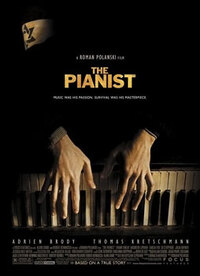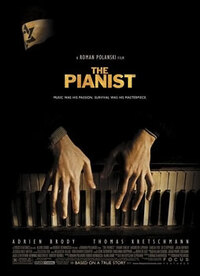- Οπτικός δίσκος βίντεο (DVD)
- Polanski,Roman
- 143 λεπτά
- Πατήστε εδώ
-
- The Pianist was widely acclaimed by critics, with Brody's performance, Harwood's screenplay, and Polanski's direction receiving special praise. On review aggregator Rotten Tomatoes, the film holds an approval rating of 95% based on 185 reviews, with an average rating of 8.20/10. The website's critical consensus reads, "Well-acted and dramatically moving, The Pianist is Polanski's best work in years."[17] On Metacritic, the film has a weighted average score of 85 out of 100, based on 40 critics, indicating "universal acclaim".[18] Roger Ebert of the Chicago Sun-Times gave the film three and a half stars out of four, noting that, "perhaps that impassive quality reflects what [director Roman] Polanski wants to say. ... By showing Szpilman as a survivor, but not a fighter or a hero—as a man who does all he can to save himself, but would have died without enormous good luck and the kindness of a few non-Jews—Polanski is reflecting ... his own deepest feelings: that he survived, but need not have, and that his mother died and left a wound that had never healed."[19] Michael Wilmington of the Chicago Tribune said that the film "is the best dramatic feature I've seen on the Holocaust experience, so powerful a statement on war, inhumanity, and art's redemption that it may signal Polanski's artistic redemption". He later said that the film "illustrates that theme and proves that Polanski's own art has survived the chaos of his life—and the hell that war and bigotry once made of it".[20] Richard Schickel of Time magazine called it a "raw, unblinkable film", and said that, "We admire this film for its harsh objectivity and refusal to seek our tears, our sympathies."[21] Mick LaSalle of the San Francisco Chronicle said that the film "contains moments of irony, of ambiguity, and of strange beauty, as when we finally get a look at Warsaw and see a panorama of destruction, a world of color bombed into black-and-white devastation". He also said that, "In the course of showing us a struggle for survival, in all its animal simplicity, Polanski also gives us humanity, in all its complexity."[22] A.O. Scott of The New York Times said that Szpilman "comes to resemble one of Samuel Beckett's gaunt existential clowns, shambling through a barren, bombed-out landscape clutching a jar of pickles. He is like the walking punchline to a cosmic jest of unfathomable cruelty." He also felt that "Szpilman's encounter, in the war's last days, with a music-loving German officer, "courted sentimentality by associating the love of art with moral decency, an equation the Nazis themselves, steeped in Beethoven and Wagner, definitively refuted".[23] ⟶ Πατήστε εδώ
-
-
In September 1939, Władysław Szpilman, a Polish-Jewish pianist, is playing live on the radio in Warsaw when the station is besieged during Nazi Germany's invasion of Poland. After escaping the bombing, Szpilman rejoices with his family at home when he learns that Britain and France have declared war on Germany, but the promised aid does not come. Fighting lasts for just over a month, with both the German and Soviet armies invading Poland at the same time on different fronts. Warsaw becomes part of the Nazi-controlled General Government. Jews are soon prevented from working or owning businesses, and are also forced to wear blue Star of David armbands. By November 1940, Szpilman and his family are forced from their home into the isolated and overcrowded Warsaw Ghetto, where conditions only get worse, with food shortages leading to starvation, and the constant threat of Schutzstaffel (SS) brutality. Szpilman manages to find work by performing in a cafè frequently visited by upper-class Jews. On one occasion, he sees a young boy being savagely beaten by a guard while trying to crawl through a gap in the ghetto wall; the boy is dead by the time Szpilman is able to pull him through. On another occasion, Szpilman and his family witness the SS kill a family in an apartment across the street during a round-up, including throwing an elderly wheelchair-bound man from a window three stories high. On 16 August 1942, Szpilman and his family are about to be transported to Treblinka extermination camp as part of Operation Reinhard. However, a friend in the Jewish Ghetto Police recognizes Szpilman at the Umschlagplatz and separates him from his family. He later becomes a slave labourer, and learns of a coming Jewish revolt. He helps the resistance by smuggling weapons into the ghetto hidden inside bags of food, on one occasion narrowly avoiding a suspicious guard. Szpilman eventually manages to escape, and goes into hiding with help from a non-Jewish friend, actor Andrzej Bogucki and his wife Janina Godlewska, who provided him an apartment to hide. In April 1943, Szpilman watches from his window as the Warsaw Ghetto Uprising, which he aided, unfolds, and then ultimately fails. After a neighbor discovers Szpilman and attempts to persecute him, he flees the apartment and meets his old friend Dorota and her husband, who provides him with another hiding place. The new apartment has a piano in it, but he is compelled to keep quiet since the apartment is located in a German area. Szpilman begins to starve and eventually suffers from jaundice after being abandoned by a member of the Polish resistance who previously supplied him food. By August 1944, Szpilman recovers and the Warsaw Uprising begins. The Home Army attacks the Schutzpolizei building across the street from the apartment, while Szpilman's hideout is destroyed by a German tank shell, forcing him to flee and hide in an abandoned hospital. Over the course of the following months, Warsaw is destroyed. Upon noticing German troops burning the hospital with flamethrowers, Szpilman escapes and wanders through the ruins. He reaches an empty house where he finds a can of pickled cucumbers. While trying to open the can, Szpilman is discovered by Wehrmacht captain Wilm Hosenfeld, who learns that he is a pianist. He asks Szpilman to play on a grand piano in the house. The decrepit Szpilman manages to play Chopin's "Ballade No. 1". Hosenfeld lets him hide in the attic of the house, which is used as his center of operations, and supplies food for him. In January 1945, the Germans are retreating from the Soviet offensive. Hosenfeld meets Szpilman for the last time, promising he will listen to him on Polish Radio after the war. Hosenfeld leaves Szpilman with a large supply of food and his greatcoat to keep warm. After Warsaw is liberated, Szpilman narrowly survives an ambush by People's Army troops who mistook him for a German. In Spring 1945, former concentration camp inmates pass by a Soviet prisoner-of-war camp holding captured German soldiers and verbally abuse them; one lamenting over his former career as a violinist. Hosenfeld, being one of the captives, walks up to the violinist and asks if he knows Szpilman which he confirms and he requests Szpilman to rescue him. The violinist later brings Szpilman back to the site but it is abandoned. After the war, Szpilman resumes his career at the Polish Radio, where he performs Chopin's "Grand Polonaise brillante" to a large prestigious audience. An epilogue notes that Szpilman died in 2000 at the age of 88, whereas Hosenfeld died in Soviet captivity in 1952.
⟶ Πατήστε εδώ
-



